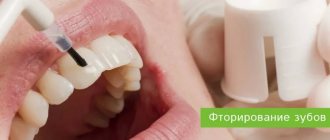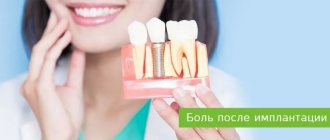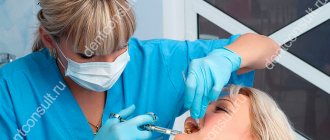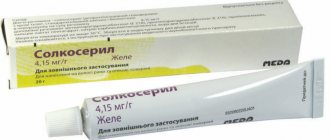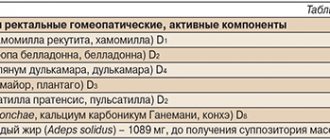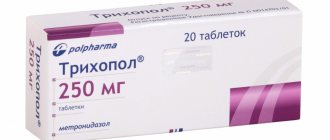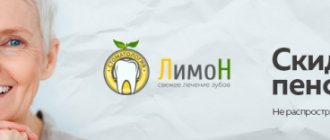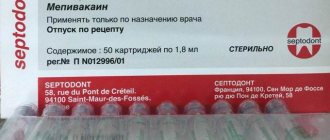Tooth extraction is a very serious procedure, even if it happens quickly and without complications. It always requires increased responsibility on the part of the patient, so it is important to know what rules of care must be followed. The dental surgeon should tell you about them in detail. But to make it easier for you to understand these recommendations, we have systematized them taking into account the specifics of each typical case.
If after tooth extraction the cheek swells and slight swelling appears, then this is considered normal. You should also not be alarmed by mild pain in the tooth socket or an increase in body temperature to 38°C (especially at night). These are all consequences of the inflammatory process. The listed phenomena should disappear on their own after 1-2 days.
Composition and release form
The main component in Ketonal is ketoprofen. It alleviates the severity of discomfort by suppressing the production of substances responsible for pain. Ketonal is sold in pharmacies in several pharmacological forms:
- in tablets and capsules;
- in the form of products for external use (gel, ointment);
- in the form of rectal suppositories;
- in the form of ampoules intended for injections.
The doctor will be able to select the appropriate form of release of the drug and its dosage after studying the characteristics of the patient’s problem and taking into account the intensity of his pain. When treating pathologies of the musculoskeletal system, it is recommended to use Ketonal in the form of ointments and gels. To eliminate neurological pain, an injection solution is used. Headaches, dental and menstrual pain are relieved with tablets.
The longest therapeutic effect is observed from the use of Ketonal suppositories. The fastest effect in relieving pain can be achieved by using the solution.
Ketonal Duo capsules have 2 colors: white and blue. The manufacturer did this in order to combine several therapeutic properties of the drug: long-lasting action and rapid pain relief.
The blue granules contain substances that allow the active component to influence the site of inflammation longer. White granules contain a larger amount of the active ingredient. Their main goal is to relieve unpleasant symptoms in a short time.
Hygiene rules after tooth extraction
The first and important rule will be to limit brushing and rinsing your teeth immediately after surgery. You can start your usual lifestyle with daily brushing of your teeth the next day.
It is worth purchasing a brush with soft bristles at a pharmacy or store in advance, but it is still necessary to clean the area of removal with special care. Irrigator and dental floss are not allowed.
Hole hygiene deserves special attention. Dental surgeons recommend the following method for care:
- take a herbal decoction or a special rinse purchased at the pharmacy into the oral cavity;
- hold it in your mouth for several minutes, without performing any additional actions such as rolling water;
- After cleansing, you should try to refrain from drinking water and food for a couple of hours.
This action will help to avoid inflammatory processes in and around the hole, and will also reduce bleeding. Baths based on an antiseptic, for example, water-based chlorhexidine or furatsilin, will be effective.
Therapeutic effect
Ketonal has a complex effect on the human body: antipyretic, anti-inflammatory, anesthetic. This property allows them to be used for pain of moderate to severe severity. The drug relieves discomfort in 10-15 minutes (depending on the form of release), and the effect of its consumption is observed for 6-8 hours.
Useful information: Ketonal Duo capsules have a prolonged action. The effect of their use is observed up to 11-12 hours.
The effect of introducing suppositories will be noticeable after 20-30 minutes. They act more slowly than Ketonal in tablets or injections, but the results from their use last as long as from the consumption of capsules
Ketonal belongs to the group of potent NSAIDs, so it can only be used if absolutely necessary. With minor discomfort, it is better to resort to drugs with a smaller list of side effects: Analgin, Paracetamol.
Instructions for use KETONAL® DUO
The simultaneous use of Ketonal with NSAIDs, including selective COX-2 inhibitors, should be avoided.
Undesirable effects can be minimized by prescribing the drug at the minimum dose for the shortest period of time necessary to control symptoms.
Elderly patients have an increased incidence of side effects of NSAIDs, especially gastrointestinal bleeding and perforation, which can be fatal.
Gastrointestinal bleeding, ulceration or perforation with risk of death has been reported for all NSAIDs at any stage of treatment, with or without warning symptoms or a history of previous severe gastrointestinal illness.
Some epidemiological data suggest that ketoprofen may be associated with a higher risk of severe gastrointestinal toxicity compared with some other NSAIDs, especially at high doses.
In patients with a history of peptic ulcer disease, especially those complicated by bleeding or perforation, and in elderly patients, the risk of gastrointestinal bleeding, ulceration or perforation increases with increasing doses of NSAIDs. In such patients, treatment should be started with the minimum effective dose.
For these patients, as well as for patients who require concomitant use of low-dose acetylsalicylic acid or other drugs that increase the risk of gastrointestinal complications, concomitant administration of drugs that protect the gastrointestinal mucosa (for example, misoprostol or proton pump blockers) may be required.
Patients who have experienced gastrointestinal toxicity, especially elderly patients during the initial stages of treatment, should report any unusual abdominal symptoms. The risk of gastrointestinal bleeding should be kept in mind.
Caution is required when using the drug in patients receiving concomitant therapy with drugs that may increase the risk of ulcerative lesions or bleeding, for example, ingestion of corticosteroids, anticoagulants such as warfarin, selective serotonin reuptake inhibitors or antiplatelet agents such as acetylsalicylic acid.
If gastrointestinal bleeding or ulceration develops in patients receiving ketoprofen, treatment should be discontinued.
NSAIDs should be prescribed with caution to patients with a history of gastrointestinal diseases (ulcerative colitis, Crohn's disease), because their aggravation is possible.
Cardiovascular and cerebrovascular effects:
- Appropriate monitoring and consultation are required for patients with a history of hypertension and/or mild to moderate congestive heart failure, manifested by fluid retention or edema, associated with NSAID treatment.
Clinical experience and epidemiological data suggest that the use of some NSAIDs (especially at high doses and during long-term treatment) may be associated with an increased risk of arterial thrombosis (eg, myocardial infarction or stroke). There is insufficient data to exclude such a risk for ketoprofen.
In patients with uncontrolled hypertension, congestive heart failure, known coronary artery disease, peripheral arterial disease and/or cerebrovascular disease, treatment with ketoprofen should be undertaken only after careful assessment of the appropriateness of its use. Such an analysis should be done before starting long-term treatment in patients with risk factors for cardiovascular disease (for example, hypertension, hyperlipidemia, diabetes mellitus, smoking).
Patients suffering from bronchial asthma, in combination with chronic rhinitis, chronic sinusitis and/or nasal polyposis, are more likely to experience allergic reactions after taking acetylsalicylic acid and/or NSAIDs than in the general population. Administration of this product may cause an attack of bronchial asthma.
Caution is also required in patients with hemostasis disorders, hemophilia, von Willebrand disease, severe thrombocytopenia and renal or hepatic failure, as well as in those taking anticoagulants (coumarin and heparin derivatives, low molecular weight heparins).
In patients with liver damage receiving diuretics, after major surgical interventions with developed hypovolemia, and especially in elderly patients, diuresis and renal function should be carefully monitored.
Ketoprofen should be prescribed with caution to patients with chronic alcoholism.
Severe skin reactions (some of them fatal) such as exfoliative dermatitis, Stevens-Johnson syndrome and toxic epidermal necrolysis have been observed extremely rarely in association with the use of NSAIDs. Patients are at greatest risk of developing these reactions at the beginning of treatment; in most cases, the occurrence of a reaction is noted within the first month of treatment. Ketonal® should be discontinued at the first appearance of a skin rash, changes in the mucous membranes or other signs of hypersensitivity.
As with any long-term treatment with non-steroidal antirheumatic drugs, therapy with ketoprofen requires monitoring of blood cells, as well as liver and kidney function, especially in elderly patients. When CC < 20 ml/min, dose adjustment of ketoprofen is necessary.
Like other NSAIDs, ketoprofen mask the signs and symptoms of infectious diseases.
Ketonal® Duo should be discontinued before major surgery.
Ketonal® Duo contains lactose. Therefore, the drug should not be prescribed to patients with rare hereditary galactose intolerance, lactase deficiency or impaired absorption of glucose or galactose.
Impact on the ability to drive vehicles and operate machinery
Patients should be warned about the possible occurrence of drowsiness, dizziness, or convulsions while taking the drug. If there is a risk of developing such reactions, patients should refrain from driving vehicles and operating machinery.
Results of preclinical safety studies
Acute toxicity. After oral administration, the LD50 of ketoprofen was 360 mg/kg in mice, 160 mg/kg in rats, and 1300 mg/kg in guinea pigs. The LD50 of ketoprofen is several times higher than that of indomethacin.
Chronic toxicity. Ketoprofen was administered orally to rats for 4 weeks at doses of 2, 6 or 18 mg/kg. 10% of animals receiving ketoprofen at a dose of 18 mg/kg died on days 6-30, some had ulceration of the intestinal mucosa. In dogs receiving the same dose, only intestinal ulcerations were described, while no animals died. Among the animals receiving indomethacin at a dose of 6 mg/kg body weight, half died; all animals receiving 18 mg/kg body weight died.
In a 6-month study, rats were administered orally ketoprofen at doses of 3, 6 or 9 mg/kg. After 8 weeks, 53% of male rats treated with 6 mg/kg and 67% of male and 20% of female rats treated with 9 mg/kg died. In animals receiving 9 mg/kg, plasma concentrations of all proteins decreased and spleen and liver weights increased. Histopathological studies of tissues from surviving animals did not reveal significant pathological changes.
Carcinogenicity, mutagenicity and effects on fertility. Long-term toxicity studies in mice administered orally ketoprofen up to 32 mg/kg/day did not reveal carcinogenic effects of this drug. The Ames test did not show any mutagenic properties. Ketoprofen did not affect the fertility of male rats that received up to 9 mg/kg/day orally. In female rats receiving 6 or 9 mg/kg/day, the number of implantations was reduced. In male rats and dogs, suppression of spermatogenesis was found. Dogs and male monkeys treated with high doses of ketoprofen experienced a decrease in testicular weight.
Teratogenicity. Neither teratogenic effects nor effects on the fetus were shown in mice receiving ketoprofen up to 12 mg/kg/day and in rats receiving up to 9 mg/kg/day. In rabbits, doses of ketoprofen toxic to the maternal organism were embryotoxic, but had a teratogenic effect.
The safety of ketoprofen has been proven by long-term clinical practice.
Indications
Not all dental problems require the use of Ketonal. Pain with mild and moderate caries can be relieved with saline solutions or special drops. If signs of discomfort appear, it is also necessary to avoid sweet and sour foods, as they provoke increased discomfort. In such cases, taking Ketonal is considered inappropriate.
Direct readings:
- Pulpitis is an inflammation of the nerve endings of the tooth, characterized by sharp, jerking pain. Spasms radiate to the temples and ears. With pulpitis, a person will not be able to sleep normally and eat food without strong medications.
- Periodontitis is an inflammation of the tooth root and adjacent membranes. Affected units appear mobile, rising above the rest of the elements. The pathology is accompanied by uncontrollable pain, which intensifies when touching the problem area.
- Periostitis is inflammation of the periosteum. Appears as a complication of pulpitis and gumboil.
- Injury to elements of a row and previous dental surgeries. Ketonal is intended to reduce the severity of the inflammatory process and relieve discomfort.
It should be noted that the painkiller will not be able to affect the cause of the problem. It only relieves his symptoms for a short time. For this reason, consuming Ketonal does not cancel a visit to the doctor (even if the pain syndrome no longer bothers you).
Contraindications
Ketonal has a strong therapeutic effect. There are a number of contraindications to its use:
- digestive system dysfunction;
- serious pathologies of the liver and kidneys;
- problems with blood clotting;
- natural feeding;
- anemia;
- exacerbation of chronic gastrointestinal diseases;
- stomatitis in acute form;
- heart failure;
- diabetes.
Taking Ketonal is also not recommended for people dependent on alcohol. Taking medication and alcohol together can have serious consequences for the body.
Before consuming Ketonal and other medications together, you should consult your doctor. Some groups of medications are incompatible with NSAIDs.
Important restrictions after tooth extraction
Each patient, in addition to recommendations, should also know what not to do:
- Visit the bathhouse, sauna or swimming pools. Experts also recommend limiting yourself to a short period of time by taking a shower rather than a hot bath.
- Go to the gym and take on heavy physical activity;
- Experiencing stress, which, oddly enough, can seriously affect the wound and even contribute to the opening of bleeding;
- Get into the mouth, in the wound area with dirty hands;
- Touch the site of tooth extraction, be it the tongue or fingers, because this will certainly lead to damage to the clot;
- Brush the removal area with a toothbrush;
- Actively rinse your mouth, because any aggressive external actions can lead to clot disruption and the development of alveolitis.
It is worth noting that representatives of the fair half of humanity are not recommended to remove teeth during the menstrual cycle, because this will only provoke bleeding from the resulting wound.
Dosage and methods of application
You can buy Ketonal without a prescription, but long-term use without a doctor’s prescription is not recommended. The main danger of self-medication is that the drug does not treat pain. Dental pathologies progress without timely treatment and lead to serious complications, for example, infection of nearby areas (sinuses, upper respiratory tract, brain) and blood poisoning.
In order to minimize the likelihood of developing side effects from taking NSAIDs, you must follow some rules indicated in the annotation for the drug:
Antibiotic for tooth pain
- Take Ketonal in tablet form with plenty of water.
- Take a glass of milk if irritation of the gastrointestinal mucous membranes occurs after taking the pill.
- Do not administer Ketonal solution for injection yourself. It is advisable that the procedure be carried out by a medical professional.
- Use the drug in the form of a gel and ointment no more than 2 times a day. It must be applied to problem areas in a thin layer. This form of the drug is not used in the treatment of dental disorders.
In order to prevent the development of negative symptoms during treatment, you must adhere to the established dosages. The treatment regimen for NVSP is indicated in the instructions for use, but it can be adjusted by a doctor for each specific case. When using Ketonal on your own, you should not exceed the indicated dosages.
The instructions for use of Ketonal indicate that its maximum daily dosage cannot exceed 200 mg. Ketonal Duo capsules are drunk 1 piece per day, since the amount of active substance in them is 2 times more than in regular tablets. The drug in tablets begins to act 15-20 minutes after administration. The exact time of onset of the effect will depend on the characteristics of each person’s body.
Rapid pain relief can be achieved by using an injection solution. The result from using the solution is observed after 15 minutes
Procedure immediately after removal
Tooth extraction is accompanied by a number of activities performed before and after the procedure:
- Do not keep the cotton swab applied by the doctor for longer than 15 minutes. It must be carefully removed so as not to disturb the blood clot. If this is done too late, the wound may become infected, as this is a favorable environment for bacteria to multiply.
- To reduce swelling and relieve pain, apply cold to the cheek, such as ice or frozen food wrapped in a towel. Keep it on your cheek for 5 minutes with constant breaks. Usually 3-5 approaches are enough, but for this, cold water must be applied in the first 4 hours after the removal procedure.
- Sometimes the dentist uses a hemostatic sponge if the bleeding does not stop for a long time. This often happens after wisdom tooth removal. This sponge has an adsorbent, antiseptic, analgesic effect and, in addition, contains the drug alvostasis. It is placed in the hole, and the patient is allowed to perform superficial application only if necessary.
- For severe pain, it is recommended to take painkillers like analgin, tempalgin, spasmalgon, ketanov, ibuprofen, etc. But it is better to consult a dentist about this, since all of the listed medications have a number of contraindications.
- After tooth extraction, you should not drink or eat for 2-4 hours. But it all depends on the complexity of the procedure. So, if several teeth were removed at once or we are talking about a case with suppuration, inflammation or a full-fledged operation with sutures, then this period may be longer. If you really want to drink, you can do this through a straw and in very small sips; optimally, water at room temperature. Under no circumstances should you drink drinks containing alcohol, as it can cause bleeding due to its diluting effect.
- You should not smoke on the day you had a tooth removed, as nicotine has an irritating effect on the tissues of the oral cavity. In addition, each puff involves the formation of a vacuum effect, which poses the risk of dislodging a blood clot and causing a dry socket. If this happens, there is a good chance that you will need medication.
Solution dosages
A single dose of solution is 100 mg. It is preferably injected into the upper shoulder or thigh. Injections should not be made into the buttocks, since there is a significant subcutaneous fat layer there, which does not allow the drug to provide the proper analgesic effect.
Injections at home are allowed only if the person has the necessary skills to carry out the procedure and can accurately calculate the required dosages. Intravenous administration of NSAIDs is carried out only through a dropper.
Side effects
It is necessary to stop taking Ketonal if the following side symptoms appear:
- nausea and vomiting;
- heart rhythm disturbances;
- diarrhea;
- severe headache;
- sleep disorders;
- allergic reactions on the skin;
- difficulty breathing;
- violations of the pronunciation of words and sounds;
- increased blood pressure.
In such cases, the doctor can adjust the dose of Ketonal or replace it with similar drugs with an analgesic effect.
special instructions
People with chronic gastrointestinal diseases are recommended to drink NSAIDs together with antacid medications (Maalox, Phosphalugel). They do not affect the effectiveness of Ketonal, but protect the walls of the stomach and intestines from irritation.
Elderly people using the drug for toothache need to monitor their blood biochemical composition. The same rule applies to patients taking medication for a long time.
It is recommended that women planning pregnancy not take the medication. Non-steroidal drugs reduce the chance of successful implantation of a fertilized egg.
It is necessary to stop consuming Ketonal immediately if signs of individual intolerance to its components appear. A similar reaction is manifested by skin rashes and swelling of the respiratory system. If these signs appear, you should take an antihistamine and consult your doctor.
Ketonal is able to influence cells of the nervous system. With oral, rectal and parental administration of the drug, drowsiness and dizziness may occur. An adverse symptom also develops in cases where the medication was taken with strict dosage considerations. Because of this, Ketonal is not recommended for people working in hazardous industries and driving vehicles.
Taking medications after tooth extraction
Experienced specialists recommend taking antihistamines. They will help avoid swelling of the cheeks, because in addition to working on allergic reactions, antihistamines also have an anti-edematous effect.
You should not overdo it with medications if the pain is tolerable and tooth extraction was a procedure of ordinary complexity. A little trick that can be remembered for the future is to take an analgesic even before the patient stops feeling the anesthesia administered by the doctor.
As for antibiotics, it is strictly not recommended to take them without a corresponding prescription from the attending physician. In what cases does the surgeon issue a referral for the purchase of necessary medications:
- for difficult removal;
- with the development of the inflammatory process;
- in case of concomitant diseases such as stomatitis or candidiasis.
Reviews
Igor, 53 years old. I have suffered from dental diseases since childhood. Apparently, bad heredity took its toll. For deep caries and pulpitis, I always take Ketonal. It effectively relieves pain for 6-7 hours. However, the last 2 times after taking it I noticed pain in my stomach. I think what analogue is better to replace this drug.
Inna, 39 years old. Toothache visits me very rarely. But when she appears, I can't do anything. Typically, exacerbations occur at night, when it is not possible to urgently consult a doctor. The last time I had a problem I took Ketonal for a toothache. Thanks to the drug, I was able to survive the night normally and even sleep. In the morning I immediately ran to the doctor for treatment.
Sergey, 41 years old. For several years in a row I have been suffering from worsening pain in my wisdom teeth. The doctor said that the eights are intact, and my discomfort is due to pericoronitis (inflammation of the gums above the one). Gradually, anti-inflammatory and painkillers stopped helping. Apparently, the body has developed an addiction to them. Now I’m solving the problem with the help of Ketonal. The product has helped me relieve pain several times. I always carry pills with me in my medicine cabinet, especially if I go on business trips.
